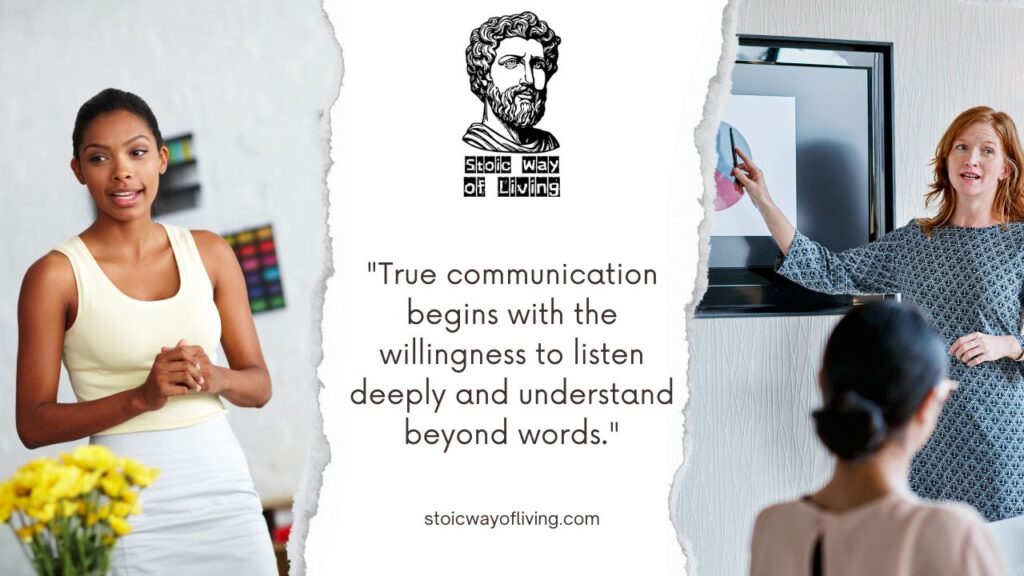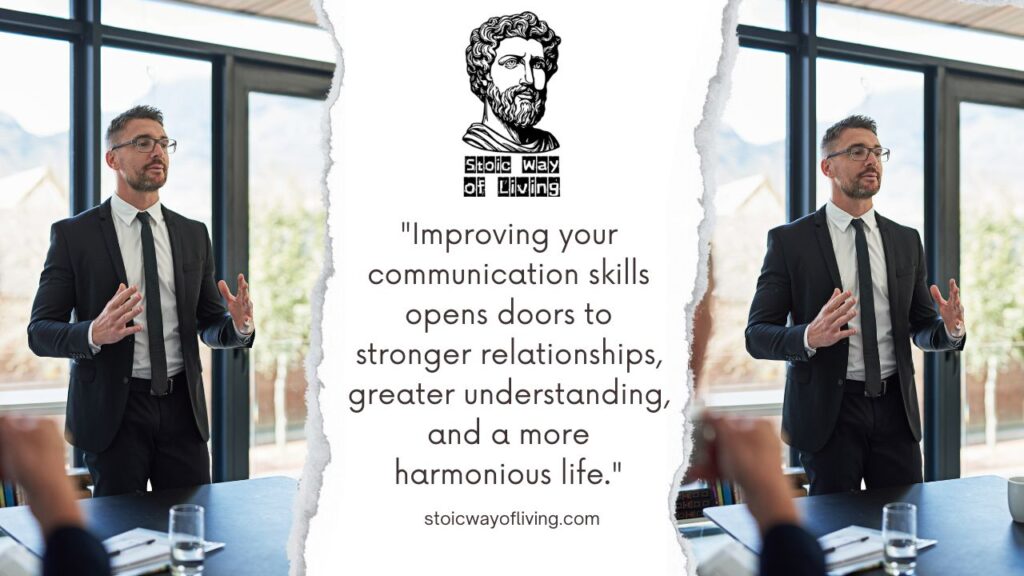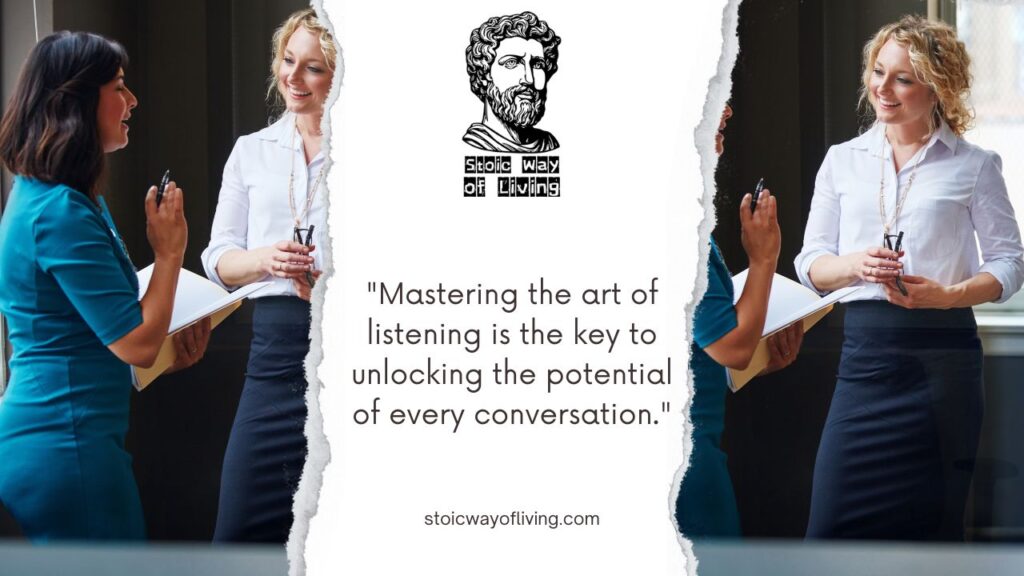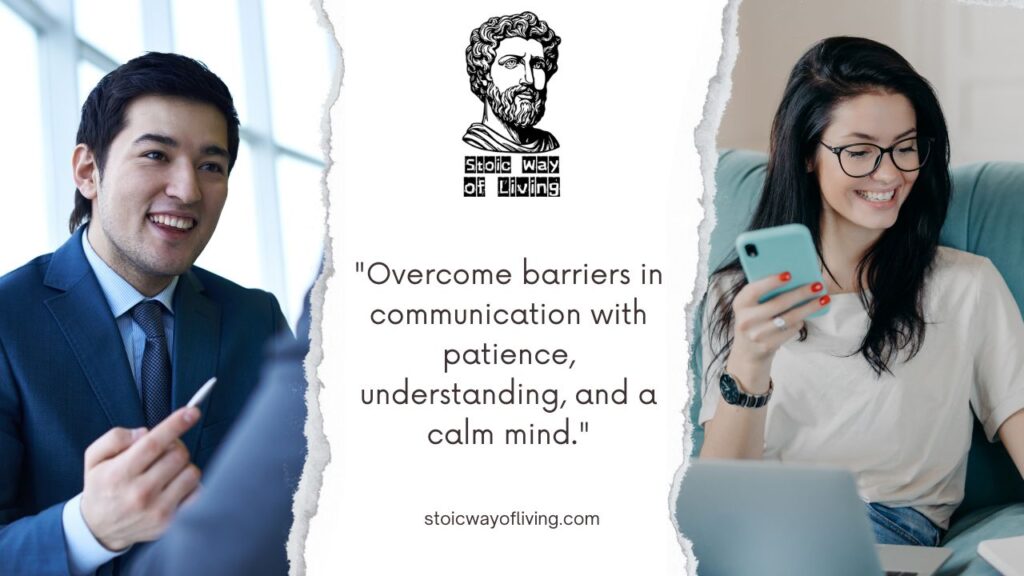Improving communication skills benefits both personal and professional life. It fosters trust, reduces conflicts, and enhances teamwork, productivity, and leadership.
This article explores how Stoic wisdom can improve communication skills, making us more empathetic, clear, and composed communicators.
Understanding Stoicism’s View on Communication

At the heart of Stoicism are four cardinal virtues: wisdom, courage, justice, and temperance.
These principles guide Stoic practitioners in rational decisions, acting with integrity, and maintaining emotional balance.
When applied to communication, they encourage us to seek clarity, speak truthfully, and engage respectfully.
Stoicism teaches us to focus on what is within our control—thoughts, words, and actions—while accepting external events with equanimity.
This mindset fosters a calm and thoughtful approach to communication, helping us navigate conversations with greater effectiveness and grace.
The Benefits of Improving Your Communication Skills

Enhancing your communication skills can lead to numerous benefits in your personal and professional life.
Improved communication fosters stronger relationships by building trust and understanding.
Communicating effectively can better convey our needs and understand others’ perspectives, reducing conflicts and misunderstandings.
Strong communication skills can enhance teamwork, productivity, and leadership effectiveness in professional settings.
Clear and concise communication helps ensure everyone is on the same page, leading to more efficient and successful outcomes.
Additionally, effective communication can boost self-confidence, as we become more adept at expressing ourselves and navigating social interactions.
By applying Stoic principles to our communication practices, we improve our ability to connect with others and cultivate a more thoughtful, rational, and empathetic approach to all our interactions.
Stoic Practices to Improve Communication Skills in Everyday Life

Applying the following Stoic principles can help improve communication, ensuring efficient outcomes and boosting self-confidence.
Listening with Empathy and Presence
Active listening is a cornerstone of effective communication.
Stoicism encourages us to listen with empathy and presence, fully engaging with the speaker without judgment or distraction.
By practicing mindfulness, we can stay present in the moment, absorbing not just the words but also the emotions and intentions behind them.
This deep level of listening fosters mutual understanding and respect.
Marcus Aurelius, a Stoic philosopher, advised: “Take delight in this one thing: to live, to speak, and to act in a way that is true and just.”
We honor the speaker by listening attentively and creating a space for genuine dialogue.

Speaking with Clarity and Purpose
Stoicism emphasizes the importance of clear and concise speech.
When we communicate, our words should reflect our rational thoughts and intentions.
This means avoiding unnecessary embellishments and getting straight to the point.
Seneca, a prominent Stoic thinker, said speech should be “short and to the point.”
Speaking with clarity involves choosing our words carefully and considering the timing and context of our message.
Knowing when to speak and remain silent is crucial to effective communication.
By aligning our speech with Stoic principles, we can convey our ideas more effectively and avoid misunderstandings.
Managing Emotions in Communication
Emotional regulation is a fundamental Stoic practice.
Stoicism teaches us to recognize our emotions without letting them control our actions. This means staying calm and composed, even during difficult conversations.
By practicing self-awareness, we can identify triggers that may cause us to react emotionally and choose to respond thoughtfully instead.
Epictetus, another Stoic philosopher, emphasized that “it’s not what happens to you, but how you react to it that matters.”
This principle allows us to manage our emotions, maintain our composure, and communicate more effectively.
Cultivating Empathy and Understanding
Empathy is essential for effective communication.
Stoicism encourages us to see things from others’ perspectives, fostering a deeper understanding of their experiences and feelings.
Practicing perspective-taking can cultivate empathy and build stronger connections with others.
This involves listening actively, asking questions, and genuinely seeking to understand the other person’s point of view.
Marcus Aurelius wrote, “Whenever you are about to find fault with someone, ask yourself the following question: What fault of mine most nearly resembles the one I am about to criticize?“
By reflecting on our experiences, we can approach others with greater compassion and understanding.

Aligning Actions with Words
Nonverbal communication plays a significant role in how our messages are received.
Stoicism teaches us to be mindful of our body language, facial expressions, and tone of voice.
These nonverbal cues should align with verbal messages to avoid confusion and build trust.
For instance, maintaining eye contact, using open gestures, and speaking with a calm and steady tone can enhance our credibility and convey confidence.
By paying attention to our nonverbal signals, we can ensure that our actions support our words, making our communication more effective and authentic.
Overcoming Communication Barriers
Effective communication often involves overcoming barriers such as misunderstandings, conflicts, and differing perspectives.
Stoic principles provide strategies for addressing these challenges.
By practicing patience, we can take the time to understand the root causes of communication barriers and address them thoughtfully.
The Stoic emphasis on rationality helps us to remain calm and objective, even in heated discussions.
Seneca advised, “If a man knows not to which port he sails, no wind is favorable.“
By staying focused on our communication goals and applying Stoic strategies, we can navigate obstacles and foster clearer, more productive conversations.
Practicing Self-Reflection

Self-reflection is a vital Stoic practice for continuous improvement.
By regularly evaluating our communication skills, we can identify growth areas and set development goals.
The Stoics believed in the power of journaling as a tool for self-reflection.
Writing down our thoughts and experiences allows us to analyze our communication patterns and make conscious adjustments.
Marcus Aurelius kept a journal where he reflected on his actions and thoughts, a practice that helped him grow as a leader and communicator.
By incorporating self-reflection into our routine, we can continually refine our communication skills and become more effective in our interactions.
Dealing with Communication Setbacks

Effective communication is a skill that requires continuous effort and practice. Despite our best intentions, setbacks are inevitable.
Whether it’s a misunderstanding, a heated argument, or a miscommunication that leads to conflict, how we handle these setbacks can significantly impact our relationships and overall communication effectiveness.
Stoic principles offer valuable guidance for dealing with these challenges gracefully and constructively.
Embrace Setbacks as Learning Opportunities
Stoicism teaches us to view every experience, including setbacks, as an opportunity for growth.
When communication breaks down, instead of dwelling on frustration or assigning blame, we can ask ourselves what we can learn from the situation.
This mindset transforms obstacles into stepping stones for personal and interpersonal development.
Practice Patience and Temperance

In moments of miscommunication, our initial reaction might be to defend ourselves or retaliate.
Stoicism encourages us to practice temperance and patience, allowing us to pause and reflect before responding.
By taking a step back, we can approach the situation calmly and rationally, seeking resolution rather than escalation.
Acknowledge and Own Your Mistakes
Taking responsibility for our part in any miscommunication is crucial for resolving conflicts and rebuilding trust.
Acknowledging our mistakes and offering sincere apologies can facilitate open dialogue and mutual understanding. As Seneca wisely stated, “To err is human, but to persist in error is diabolical.”
Owning up to our errors demonstrates integrity and fosters a culture of accountability.
Seek Clarification and Feedback
When communication goes awry, seeking clarification can help clear up misunderstandings.
Asking questions and inviting feedback shows we are committed to resolving the issue and improving future interactions.
This approach addresses the immediate problem and strengthens the foundation of trust and openness in our relationships.
Reflect and Adjust
After addressing a communication setback, it is essential to reflect on what happened and why.
Consider what triggered the miscommunication and how it could have been handled differently. This reflection helps us identify patterns and areas for improvement.
By adjusting our approach, we can enhance our communication skills and prevent similar setbacks in the future.
Practice Forgiveness and Letting Go
Holding onto grudges or dwelling on past communication failures can hinder our ability to move forward.
Stoicism teaches the value of forgiveness and letting go.
By forgiving ourselves and others, we release negative emotions and create space for positive, constructive interactions.
This practice improves our communication and contributes to our overall well-being.
See also: The Power of Practicing Forgiveness – Your Ultimate Stoic Guide!
Conclusion
Integrating Stoic principles into our communication practices can profoundly transform our interactions.
We can enhance our communication skills and build meaningful relationships by embracing active listening, speaking clearly, managing our emotions, and continuously reflecting on our actions.
Effective communication is not just about exchanging information; it’s about understanding the emotions and intentions behind the words.
To further enhance your communication skills, consider exploring Ian Tuhovsky’s book Communication Skills Training. This book provides practical insights and techniques to help you communicate effectively, avoid conflicts, and achieve your goals. Check it out on Amazon!


